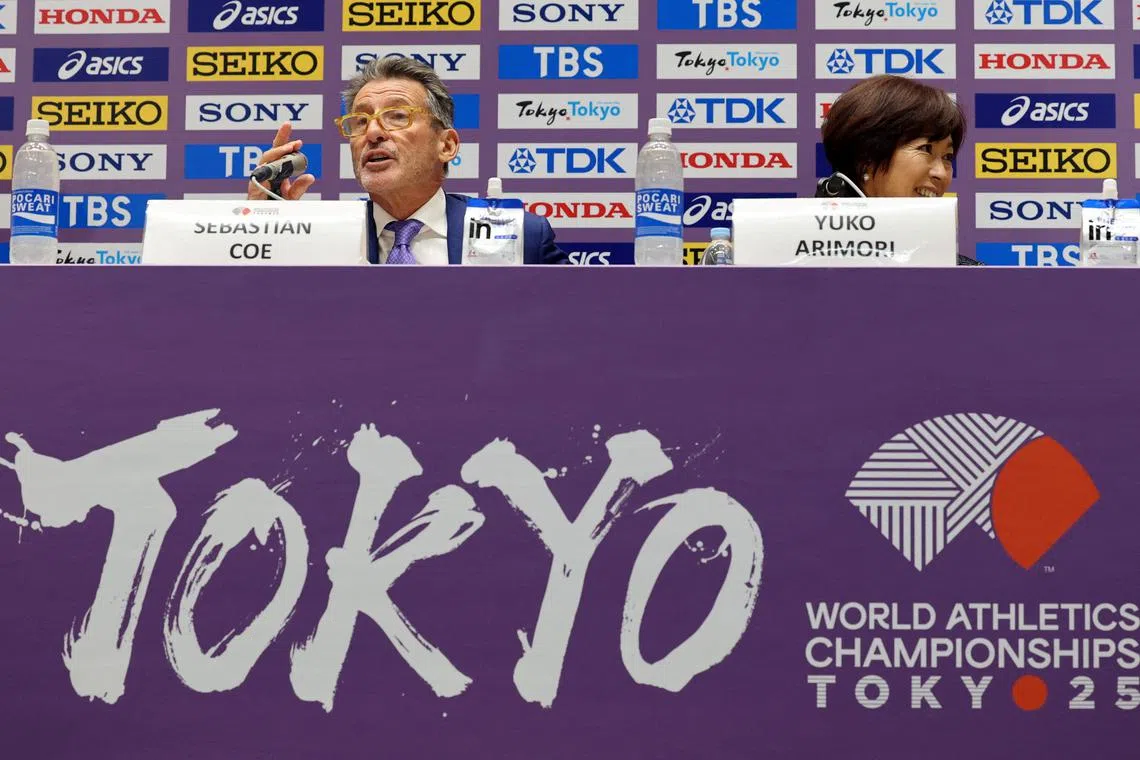Sebastian Coe pleased that World Athletics Championships are now season’s finale
Sign up now: Get the biggest sports news in your inbox

World Athletics president Sebastian Coe and president of the Japan Association of Athletics Federations Yuko Arimori during the opening press conference.
PHOTO: REUTERS
Follow topic:
TOKYO – World Athletics president Sebastian Coe said he has received overwhelming support from athletes and coaches for the decision to make the World Athletics Championships, which begin in Tokyo on Sept 13, the “crescendo” of the sport’s season.
Other than Doha in 2019 for heat-avoidance reasons, the world championships and Olympics have invariably been followed by the finale of the Diamond League.
That meant athletes were coming off what could be the biggest event of their lives, only to immediately start preparing to compete again a week or so later.
“I think that not only is this something the athletes are overwhelmingly supportive of, I think it makes sense,” Coe said at the meet’s press conference on Sept 12.
“We did consult widely with all our stakeholders and I think we settled on the right format.”
Coe said that the sport recognised the anomaly of its major global event not being the finale.
“I think they (the fans) were confused about a season that seemed to have its crescendo in a world championships or an Olympic Games... then we were in Zurich or Brussels or wherever a few days later and they couldn’t really relate to what that meant,” he said.
“I think there is now a pace and a rhythm to it and they know this is the end of the season.”
Coe also said three-time 400m hurdles world champion Karsten Warholm had welcomed the change.
“He told me, ‘Now I can get away, I can go into my training camp, I can sleep. I can do all the things that are going to leave me in great shape’,” he said.
The event’s opening weekend features a blockbuster Sept 14 night when the men’s and women’s 100m finals are within seven minutes of each other, rather than on separate nights, as is usually the case.
Coe dismissed suggestions that the men’s race, which closes out the night, might overshadow the women’s, which looks to be one of the tastiest events of the whole championships.
“I don’t think so,” he said. “These are big-ticket events. We’ve looked at this, we’ve spoken broadly and our competition programme comes together incrementally. We think that it will work well. We’ll see.”
He added that there was a real “emotional connection” about Tokyo hosting the championships, having held the Olympics in 2021 without any fans.
Now the magnificent Japan National Stadium will be near capacity for each of the nine nights, with almost 500,000 tickets already sold and 2,000 athletes from 200 countries taking part.
“This is the largest global sporting event of the year by some distance... with a new stadium, specifically refurbished for track and field, full of noisy, passionate and knowledgeable fans,” he said.
In his 10th year since taking on the presidency, the Briton said the sport now has a great platform to build on after the battles of his early years to reform the governing body and the sport that were rocked by corruption and doping.
“The first four years were really preventing the sick ship from capsizing,” said the 68-year-old.
“The next four were really about putting in all those things that allowed us to have a platform to be talking about and delivering a different type of world championships.
“And that really is my remaining two years. I’m in a hurry, we’re going to drive a lot of these things through.”
The championships begin with the men and women’s 35km race walks on Sept 13 morning, brought forward to 7.30am to minimise the impact of heat and humidity.
The evening session is highlighted by the finals of the men’s shot put, the women’s 10,000m, the mixed 4x400m relay and the first round of both 100m races.
On the sidelines, Coe said World Athletics was within “touching distance” of their goal of having all female athletes undergo gene testing before the start of the championships.
The one-time test, conducted via a cheek swab or blood test, was made a requirement of competing in the female category at the elite level of the sport in March, following a meeting of the World Athletics Council.
Said Coe: “We were on 95 per cent I think the other day, we’re inching our way there... It’s had its challenges, but we are pretty much there, and I’m really pleased that we agreed to do that.” REUTERS

